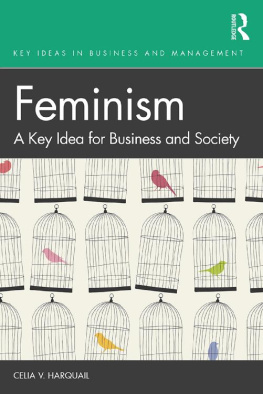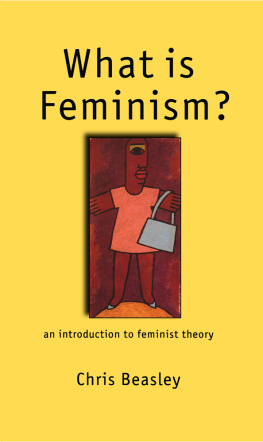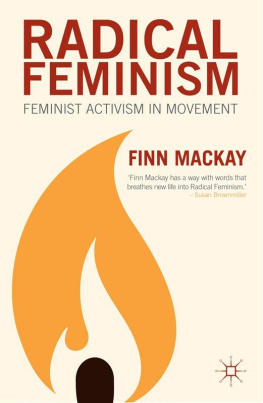As we look around all corners of the globe, feminism is in action. This accessible text introduces the reader to the most contemporary subjects and crucially asks critical organizational questions that benefit from the engagement with feminism.
Alison Pullen , Macquarie University, Australia
Business and feminism may seem an unlikely combination at first glance. This wonderfully innovative and readable book brings them together to great effect. Celia Harquail provides all of the tools needed to really make a feminist difference at work.
Scott Taylor , Birmingham University, UK
FEMINISM
In this concise book, feminist thought is made accessible and relevant to both students and management practitioners. An empowering introduction to an often-overlooked key idea, this book illuminates how feminist thinking can liberate our understanding of work and management.
Feminism: A Key Idea for Business and Society boldly challenges assumptions about both feminism and business. It offers a primer on feminism for business and explains feminist interventions including adding womens voices, pushing for equality, and practicing feminist values to make businesses more successful and more just. It analyzes the obstacles organizations and individuals face in their efforts to address gender inequality, and demonstrates how feminist interventions have changed the terms of business conversations around topics such as defining work, centering the economy around care, how jobs work and wages are gendered, violence in the workplace, horizontal and peer-to-peer organizational structures that dont depend on dominance, enlightened leadership models, and power. As this book demonstrates, feminism has already had a profound impact on business, with many of its key tenets incorporated into business thinking.
As one of the first books to offer feminist insights and critiques of business to the practicing manager, business student, and non-academic, this book offers a fresh, positive vision that is remarkably relevant.
Celia V. Harquail , PhD, is co-founder of Feminists at Work and co-producer of Entrepreneurial Feminist Forums. She consults and writes about feminist business practice, and has taught at the Darden Graduate School of Business, UVA and Stevens Institute of Technology.
Key Ideas in Business and Management
Edited by Stewart Clegg
Understanding how business affects and is affected by the wider world is a challenge made more difficult by the disaggregation between various disciplines, from operations research to corporate governance. This series features concise books that break out from disciplinary silos to facilitate understanding by analysing key ideas that shape and influence business, organizations and management.
Each book focuses on a key idea, locating it in relation to other fields, facilitating deeper understanding of its applications and meanings, and providing critical discussion of the contribution of relevant authors and thinkers. The books provide students and scholars with thought-provoking insights that aid the study and research of business and management.
Hierarchy
A Key Idea for Business and Society
JOHN CHILD
Feminism
A Key Idea for Business and Society
CELIA V. HARQUAIL
For more information about this series, please visit: www.routledge.com/Key-Ideas-in-Business-and-Management/book-series/KEYBUS
FEMINISM
A KEY IDEA FOR BUSINESS AND SOCIETY
Celia V. Harquail

First published 2020
by Routledge
2 Park Square, Milton Park, Abingdon, Oxon OX14 4RN
and by Routledge
52 Vanderbilt Avenue, New York, NY 10017
Routledge is an imprint of the Taylor & Francis Group, an informa business
2020 Celia V. Harquail
The right of Celia V. Harquail to be identified as author of this work has been asserted by her in accordance with sections 77 and 78 of the Copyright, Designs and Patents Act 1988.
All rights reserved. No part of this book may be reprinted or reproduced or utilised in any form or by any electronic, mechanical, or other means, now known or hereafter invented, including photocopying and recording, or in any information storage or retrieval system, without permission in writing from the publishers.
Trademark notice : Product or corporate names may be trademarks or registered trademarks, and are used only for identification and explanation without intent to infringe.
British Library Cataloguing-in-Publication Data
A catalogue record for this book is available from the British Library
Library of Congress Cataloging-in-Publication Data
Names: Harquail, Celia V., author.
Title: Feminism: a key idea for business and society / Celia V. Harquail.
Description: Abingdon, Oxon; New York, NY: Routledge, 2019. | Series: Key ideas in business and management | Includes bibliographical references and index.
Identifiers: LCCN 2019009030| ISBN 9781138315099 (hardback) | ISBN 9781138315181 (pbk.) | ISBN 9780429456503 (ebook)
Subjects: LCSH: Sex discrimination in employment. | Sex role in the work environment. | Feminism. | Equality.
Classification: LCC HD6060 .H369 2019 | DDC 331.4--dc23
LC record available at https://lccn.loc.gov/2019009030
ISBN: 978-1-138-31509-9 (hbk)
ISBN: 978-1-138-31518-1 (pbk)
ISBN: 978-0-429-45650-3 (ebk)
Typeset in Joanna
by Deanta Global Publishing Services, Chennai, India
Contents
Loving thanks to my spouse Todd and my daughter Evangeline for their social reproductive work caring for me while I wrote, and to my daughter India for her intrepid research assistance. Deep gratitude to Petra Kassun-Mutch, Golnaz Golnaraghi, and especially my co-founder Lex Schroeder of Feminists at Work, for inspiring me as they put feminist leadership into practice. Heartfelt affection and appreciation for Liz ODonnell, Cali Yost, Lili Powell, Ellen Poteet, Julia Harquail, Barbara Orser, Jody Suden, Susan Helman, Jennifer Brown, Ian Ayres, and Lizette Clarke for believing in the importance of this work and demonstrating this by supporting me. I am indebted to Terry Clagues prescient idea-spotting. I acknowledge that I work and live in the traditional homelands of the Ojibwe, Potawatomi, and Odawa peoples. This project is in partnership with my sisters and siblings in the community of entrepreneurial feminists that stretches from Vancouver to Manhattan and across the internet, all of whom are building businesses that provide life-affirming products to customers, just returns to investors, and right livelihoods to employees and owners, while advancing all of us towards flourishing.
Unequal. Tense. Unrequited. Antagonistic. Awkward. These are polite attempts to describe the relationship between business and feminism. These two perspectives on the world dont seem to have much between them that might support a positive connection. They have no common background, no mutual admiration, and no shared enemy to bring them together. As you may have wondered yourself, its not even clear that the two perspectives should have a relationship at all.
Their relationship, if we can call it that, has always been lopsided. For decades and decades, feminism has been calling for business to transform how it operates. Feminism has asked business to include the perspectives of women in its considerations, to provide women and all people equal opportunities for paid employment and decision-making authority, and to transform what business prioritizes and defines as success. Business has attempted to quiet feminism by responding begrudgingly and only selectively. While feminism has struggled to get businesss attention, business has dismissed feminisms presence as largely irrelevant, and waved away feminisms fundamental critiques.











